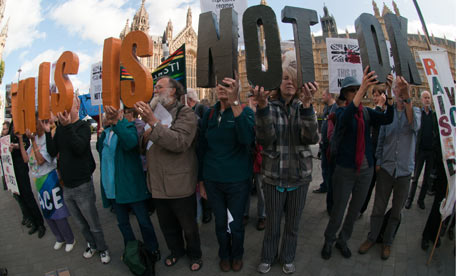
Demonstrators, outside the Houses of Parliament, protest against the DSEi arms fair being held at the Excel Centre, London. Photograph: Peter Marshall/Demotix
Organisers of the UK's leading arms fair, which last week attracted some 25,000 visitors from around the world, are under pressure to explain why the event was used to promote illegal torture equipment and cluster bombs.
A stall at the Defence and Security International fair (DSEi) in London's Docklands promoted equipment by a company called CTS-Thompson that included leg cuffs, waist chains, lead chains and an "enhanced transport restraint system" that combines chains and cuffs. The DSEi website explicitly states the sale of "leg irons, gang chains, shackles and shackle bracelets" are prohibited. It was not until Amnesty International's intervention that the stall was closed. The revelation is particularly embarrassing for the DSEi as it has been forced to shut down stalls promoting similar equipment in the past.
In 2007, two companies, Cardiff-based BCB International and Famous Glory Holding, a Chinese company, were expelled from the exhibition by organisers, Reed Elsevier, after anti-arms trade campaigners found they were promoting banned leg restraints.
"It is totally unacceptable that this illegal equipment should yet again be advertised at a UK arms fair," said Oliver Sprague of Amnesty International.
It has also emerged that the fair was used to promote cluster bombs munitions that are banned under a 2008 convention to which the UK became a party in 2010.
Two companies, Pakistan Ordnance Factory and Pakistan's Defence Export Promotion Organisation, displayed promotional material for artillery-launched cluster munitions.
Similar concerns about both Pakistani weapons producers were raised during the 2009 DSEi arms fair. "It was totally unacceptable when cluster bombs were promoted at DSEi in 2009, but it's frankly baffling that the DSEi can have made the same mistake two years later," said Thomas Nash, Director of UK campaign group Article 36. The revelation that Britain was unwittingly helping promote cluster munitions comes at an inauspicious time.
Campaigners and government delegates were last week attending the Second Meeting of States Parties to the Convention on Cluster Munitions in Beirut, Lebanon, where states reaffirmed their commitment to bring all countries on board the treaty and to eradicate cluster munitions completely.
"Earlier this week, the UK ambassador to the Beirut meeting said the fact that countries are still using cluster munitions should enrage us. The UK should also be enraged that the system has failed to prevent foreign companies promoting these deadly weapons in London," said Anna Macdonald, head of arms control for Oxfam.
The DSEi said it was investigating. It said its "robust and appropriate" action showed its commitment to domestic and international law.
But Sprague was crticial of DSEi. "It is wrong that it falls to Amnesty International and other organisations to police the fair and that we have uncovered these materials after one quick cursory glance through the brochure, when they were missed by alleged vigorous scrutiny from both DSEi's compliance unit and the authorities."
No comments:
Post a Comment